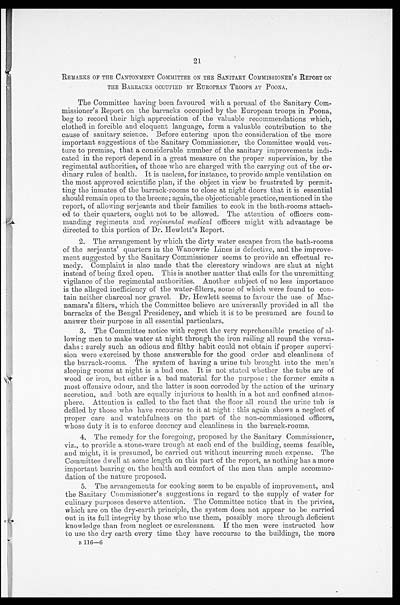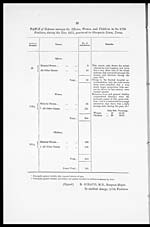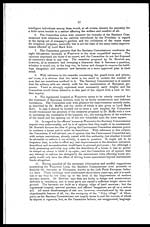Medicine - Institutions > Army health reports and medical documents > Reports on military cantonments and civil stations in the Presidency of Bombay inspected by the Sanitary Commissioner in the years 1875 and 1876 > Part I [i.e. 1] - Reports on military cantonments inspected in 1876
(224) Page 21
Download files
Individual page:
Thumbnail gallery: Grid view | List view

21
REMARKS OF THE CANTONMENT COMMITTEE ON THE SANITARY COMMISSIONER'S REPORT ON
THE BARRACKS OCCUPIED BY EUROPEAN TROOPS AT POONA.
The Committee having been favoured with a perusal of the Sanitary Com-
missioner's Report on the barracks occupied by the European troops in Poona,
beg to record their high appreciation of the valuable recommendations which,
clothed in forcible and eloquent language, form a valuable contribution to the
cause of sanitary science. Before entering upon the consideration of the more
important suggestions of the Sanitary Commissioner, the Committee would ven-
ture to premise, that a considerable number of the sanitary improvements indi-
cated in the report depend in a great measure on the proper supervision, by the
regimental authorities, of those who are charged with the carrying out of the or-
dinary rules of health. It is useless, for instance, to provide ample ventilation on
the most approved scientific plan, if the object in view be frustrated by permit-
ting the inmates of the barrack-rooms to close at night doors that it is essential
should remain open to the breeze; again, the objectionable practice, mentioned in the
report, of allowing serjeants and their families to cook in the bath-rooms attach-
ed to their quarters, ought not to be allowed. The attention of officers com-
manding regiments and regimental medical officers might with advantage be
directed to this portion of Dr. Hewlett's Report.
2. The arrangement by which the dirty water escapes from the bath-rooms
of the serjeants' quarters in the Wanowrie Lines is defective, and the improve-
ment suggested by the Sanitary Commissioner seems to provide an effectual re-
medy. Complaint is also made that the clerestory windows are shut at night
instead of being fixed open. This is another matter that calls for the unremitting
vigilance of the regimental authorities. Another subject of no less importance
is the alleged inefficiency of the water-filters, some of which were found to con-
tain neither charcoal nor gravel. Dr. Hewlett seems to favour the use of Mac-
namara's filters, which the Committee believe are universally provided in all the
barracks of the Bengal Presidency, and which it is to be presumed are found to
answer their purpose in all essential particulars.
3. The Committee notice with regret the very reprehensible practice of al-
lowing men to make water at night through the iron railing all round the veran-
dahs: surely such an odious and filthy habit could not obtain if proper supervi-
sion were exercised by those answerable for the good order and cleanliness of
the barrack-rooms. The system of having a urine tub brought into the men's
sleeping rooms at night is a bad one. It is not stated whether the tubs are of
wood or iron, but either is a bad material for the purpose: the former emits a
most offensive odour, and the latter is soon corroded by the action of the urinary-
secretion, and both are equally injurious to health in a hot and confined atmos-
phere. Attention is called to the fact that the floor all round the urine tub is
defiled by those who have recourse to it at night: this again shows a neglect of
proper care and watchfulness on the part of the non-commissioned officers,
whose duty it is to enforce decency and cleanliness in the barrack-rooms.
4. The remedy for the foregoing, proposed by the Sanitary Commissioner,
viz., to provide a stone-ware trough at each end of the building, seems feasible,
and might, it is presumed, be carried out without incurring much expense. The
Committee dwell at some length on this part of the report, as nothing has a more
important bearing on the health and comfort of the men than ample accommo-
dation of the nature proposed.
5. The arrangements for cooking seem to be capable of improvement, and
the Sanitary Commissioner's suggestions in regard to the supply of water for
culinary purposes deserve attention. The Committee notice that in the privies,
which are on the dry-earth principle, the system does not appear to be carried
out in its full integrity by those who use them, possibly more through deficient
knowledge than from neglect or carelessness. If the men were instructed how
to use the dry earth every time they have recourse to the buildings, the more
B 116—6
Set display mode to: Large image | Zoom image | Transcription
Images and transcriptions on this page, including medium image downloads, may be used under the Creative Commons Attribution 4.0 International Licence unless otherwise stated. ![]()
| Permanent URL | https://digital.nls.uk/75009204 |
|---|




